Democratic Republic of the Congo. Bleak future.
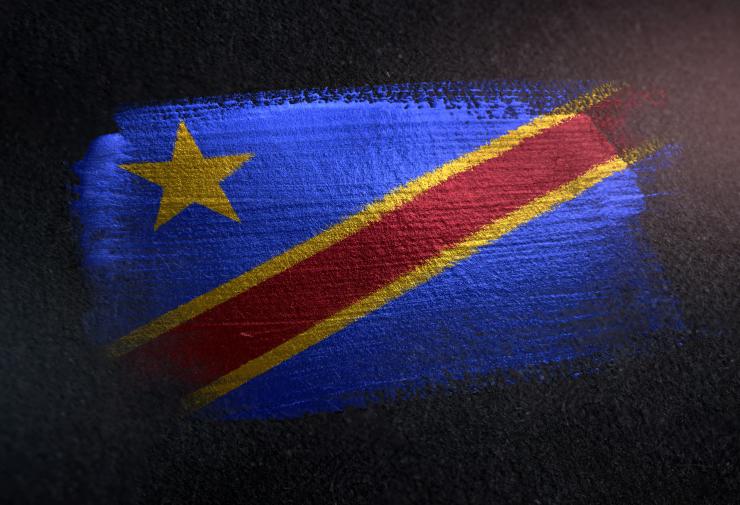
On 20 January, President Tshisekedi was sworn in for a second term. But electoral fraud has reached such proportions that the future
looks rather bleak.
Felix Tshisekedi was sworn in as president on 20 January 2024 for a second mandate. On the last 31 December, the Democratic Republic of the Congo’s Independent National Electoral Commission (CENI) had already declared him the winner of the 20 December 2023 election with 73.4 percent of the votes cast. The incumbent’s victory was confirmed on the last 10 January by the Constitutional Court which is controlled like CENI by Tshisekedi’s appointees. Tshisekedi’s main rival, the former governor of Katanga, Moise Katumbi obtained 18.8 % of the votes. Martin Fayulu, came third with 5.33% while the Peace Nobel 2018, the gynaecologist Denis Mukwege, obtained only 0.27 % of the votes. Yet, such results look surprising since pre-election surveys did not show any of the 20 candidates securing a majority in an election characterized by a low turnout of 43 percent compared to 67 percent in 2018, which can be explained by logistical problems and insecurity which prevented most of the seven million displaced people in the Ituri, Mai Ndombe and North Kivu provinces to cast their votes.
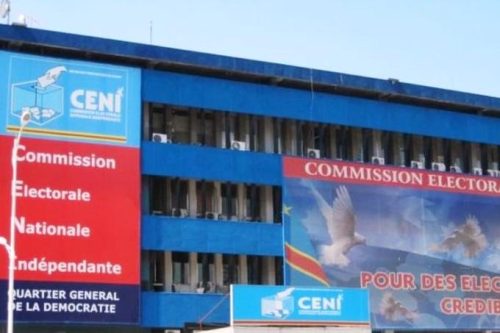
The headquarters of the Congolese Independent National Electoral Commission (CENI) in Kinshasa. File swm
The election was marred with incidents. The Mission of Observers set by the Catholic bishops’ Conference (CENCO) and the protestant Church of Christ in Congo (ECC) documented over 3,000 cases of interrupted voting. About 42 percent of its reports mentioned missing voter lists, ballot papers and indelible ink or ineligible voter cards.
The Christian observers documented also 247 cases of vote buying, 49 cases of ballot stuffing, the destruction of 51 ballot stations (namely in the Sankuru and Tanganyika provinces), fighting in 551 ballot stations, over 2,000 cases of electronic vote malfunctioning, and 180 cases of intimidation. In 14% of the cases, the lists of voters were not publicly disclosed. About one-third of the reports mention that witnesses did not sign the election minutes.
Thousands of “pirate” voting machines were identified by opposition sources, including five in the home of the President’s mother, Marthe Tshisekedi. The possible involvement in the fraud of CENI’s chairman Denis Kadima was mentioned on social media after he announced the results of the Upper Katanga province before the compilation of the votes had begun.
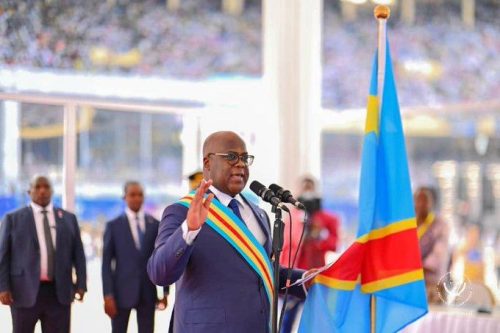
The President of the Democratic Republic of Congo, Felix Tshisekedi, was sworn in for a second term. Photo: The President’s Office.
On 31 December, the main opposition leaders condemned in a joint communiqué what they called “a mock election” and called for “the organization of true elections”. They urged the citizens to demonstrate against the “vote stealers” and save democracy.
The Catholic Archbishop of Kinshasa, Cardinal Fridolin Ambongo, called the polls “a gigantic organized disorder” during the Christmas mass. In their report, the Christian observers urged CENI and all Congolese courts to draw all appropriate conclusions before proclaiming the provisional results of the ballots of the presidential, legislative, provincial and local elections. It insisted on the need to take into account all the irregularities to ensure the acceptance of the results by the citizens. The authorities’ response was violent: on 27 December police and security forces broke up a protest in Kinshasa, organized by the supporters of Martin Fayulu who spoke of “CENI’s farfetched results”. Other demonstrations took place in Bunia, Goma and Lubumbashi.
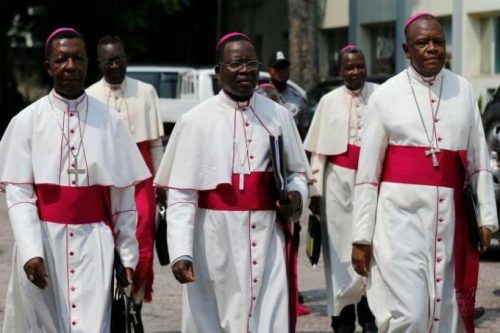
In May 2023, the Catholic bishops called for an independent audit of the voter register to foster public confidence. File swm
This chaos was a foretold story. In May 2023, the Catholic bishops called for an independent audit of the voter register to foster public confidence. But their offer to assist experts was dismissed by CENI despite lots of malpractices including the registration of minors, breakdowns of voting machines and the poor quality of voter cards. By then, the Christian observers stressed the lack of consensus in the appointment of CENI members whose president was handpicked by Tshisekedi. The credibility of the election was also harmed by the DRC government’s decision to refuse to accredit observers from the European Union and the East African Community.
The suspicious death on 24 December of a computer expert of the EU Observers Mission who had remained in Kinshasa raised suspicions since he could have been able to assess the validity of the vote and the mismanagement of computerized data by CENI. According to the official version, this expert committed suicide by jumping out from his room at the Hilton hotel. Shortly before, the news agency ACP raised the possibility of assassination before adopting the version of the suicide after the author of the news report was interrogated by the ANR intelligence officers.
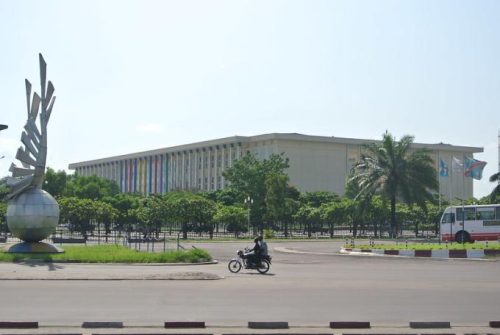
The People’s Palace in Kinshasa, which houses the Congolese Parliament. The DRC ruling Union for Democracy and Social Progress (UDPS) party of President Felix Tshisekedi won the majority of seats in the December parliamentary elections.
CC BY 2.0/ Antoine Moens de hase.
Despite all the incidents that occurred during the ballot, the Christian Observers mission came up with rather “soft” conclusions at the end of December. Their preliminary statement praised CENI’s and the government’s efforts to carry out the electoral process. It also noted that one candidate was well ahead of the others with more than half of the votes cast, confirming thereby Tshisekedi’s lead. This timid conclusion of the churches of their findings is easily understandable, owing to the intimidations and threats they received.
On 27 December 2023, a violent voice message by a pro-Tshisekedi supporter said: “Dear Congolese compatriots, we are fed up with this so-called roman catholic CENCO and co. If the catholic church reacts in a way that is contrary to the truth of the ballots, I shall call all Congolese, the young, the bravest to attack all the buildings of this so-called church, destroy them, attack the faithful during the mass (…) and to beat them to death”.
Such threats were taken seriously by the bishops who remembered earlier violence against the churches. In August 2021, the archbishopric building in Kinshasa and 12 churches in Kasai were attacked and desecrated by pro-Tshisekedi youth after CENCO and the ECC had voiced their disagreement over the appointment of a pro-Tshisekedi chairman at CENI.
The opposition was also intimidated by the murder on 13 July 2023 of Chérubin Okende, a former Minister of Transports and Moise Katumbi’s spokesperson who was found dead in his jeep in Kinshasa after he was kidnapped by six military intelligence officers. Before, on 30 May, the military intelligence arrested at the international airport of Kinshasa, Katumbi’s main adviser Salomon Kalonda who was charged with illegal possession of a weapon and high treason on behalf of Rwanda and of the M23 rebels and, despite the lack of evidence, he is still in jail.
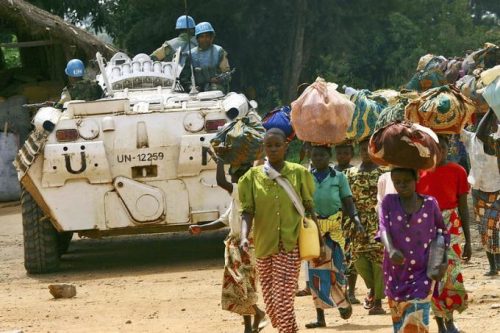
Villagers going to the local market in Bogoro walk past a Bangladeshi patrol unit of the United Nations Mission in the Democratic Republic of the Congo (MONUC).
UN Photo/Martine Perret.
The timid reaction was also encouraged by the attitude of international partners. Before the election, on 19 December, during the debate at the UN Security Council on a resolution renewing the mandate of the UN Mission for the Stabilisation of Congo (MONUSCO), the US ambassador, Robert Wood made this comment, suggesting that the result of elections was not the main issue: “We know that democracy does not end at the ballot box. In fact, it is what comes next that truly matters”, he said.
The impression prevails that the United States’ position is to accept the “fait accompli”, in the hope that Tshisekedi, in contrast with his predecessor Joseph Kabila, will better take into account Western interests suggests the Congolese president’s announcement in May 2023 that huge mining contract with China would be reviewed.
The Belgian government was the first to congratulate Tshisekedi for his alleged victory after the official announcement by the Constitutional Court. The Belgian Foreign Affairs communiqué mentioned logistical and operational failures during the ballot and urged Tshisekedi to continue his efforts in favour of good governance and human rights, despite the assassination and the jailing of opponents and the embezzlement of electoral funds. France also congratulated Tshisekedi in a gesture that meant to avoid a confrontation with the most populated French-speaking country worldwide in a context where its influence in Africa is waning after its troops were ordered out by three Sahel countries.
We also heard that Western diplomates exerted discrete pressures on the bishops to dissuade them from challenging openly the validity of the results. Time will tell if this kind of realpolitik which ignores the will of the Congolese people will bear fruits.
Even if no major trouble has been reported since the proclamation of Tshisekedi’s victory, it is not guaranteed that some of the constitutional reforms proposed by his supporters such as the extension of the presidential mandate from five to seven years or the suppression of the limit of the number of mandates, will be accepted by the Congolese people. (Open Photo: The national flag of the DR. Congo. 123rf)
François Misser



